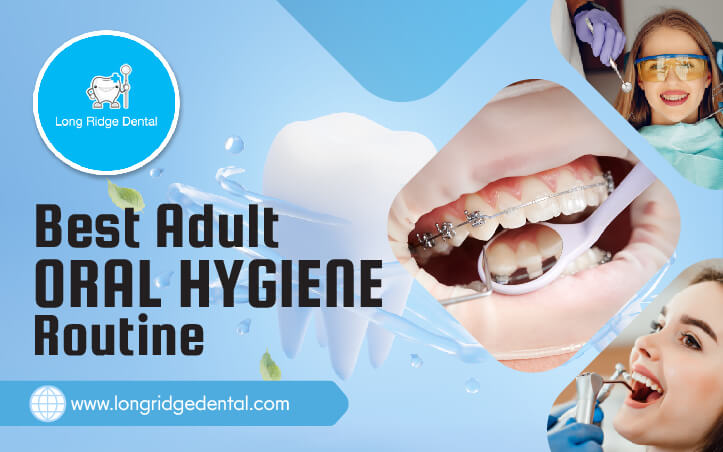
Best Adult Oral Hygiene Routine
A healthy set of teeth plays a significant role in a beautiful smile, which is almost the only language. Your smile’s message can thus be built or destroyed by your oral hygiene practices.
However, if you’re like most people, taking care of your teeth is one of those grooming rituals you engage in naturally and without much effort.
The foundation is brushing and flossing, but oral hygiene goes beyond having healthy teeth. Additionally, although maintaining good dental hygiene may not be as vital now as doing your hair or choosing your daily wardrobe, it may be in the future.
How Does Oral Hygiene Work?
Plaque buildup is intended to be avoided by following a good dental hygiene regimen. It’s a common misconception that maintaining oral hygiene requires a few minutes daily to clean your teeth.
You would eventually need to visit a dentist even if you washed your teeth properly every day. Despite having perfect practices, you could be shocked to discover that you have dental issues (such as cavities).
Did you realize that brushing too forcefully or repeatedly can exacerbate existing issues? Yes, that does happen. You will experience problems if you don’t use the right products or brush correctly. Cleaning can successfully remove plaque from your teeth’ chewing surface, the rear, and the front.
You may not follow a healthy oral hygiene regimen if you’re wondering why you still have “sweater teeth” or someone has commented on your bad breath.
Why, then, does brushing not suffice? Since there are additional factors to take into account, such as:
- Plaque builds up between your teeth where toothbrush bristles cannot reach.
- Your teeth and gums require routine examination and skilled cleaning. Even the finest dental hygiene regimen may fail to remove plaque from problematic spots altogether.
- Your teeth and gums can suffer from the meals and drinks you choose to consume.
Despite your most significant home care efforts, some habits, such as grinding and clenching, can harm teeth and cause dental disease. To lessen the damaging effects on Oral Health, you might need an Invisalign clear aligner or a nightguard.
1. Use A Fluoride Toothpaste
Beyond whitening ability and flavor, there are other factors to consider while choosing toothpaste. Make sure it contains fluoride, whichever version you pick. While fluoride has received attention from individuals concerned about how it affects other aspects of health, it is still a crucial component of oral health.
This is because fluoride is a complete protection against tooth decay. A proper oral hygiene functions by protecting your teeth from harmful microorganisms and by battling the bacteria that can cause tooth decay.
2. Use Mouthwash
It’s amazing what a good mouthwash can do. Mouthwashes are excellent for oral health and getting into those nooks and crannies that would be challenging to access otherwise, ensuring that all food particles are eliminated, and dangerous bacteria are neutralized.
Consider using a fluoride-containing mouthwash to help strengthen your enamel or a remineralizing mouthwash to help build a barrier against plaque, bacteria, and tooth decay.
3. Floss Daily
Although it is a crucial element of a healthy regimen, many patients admit to neglecting this step. Small food fragments and other deposits overlooked by your toothbrush when you merely brush and assume you don’t need to floss can eventually cause decay.
When you first start flossing, it could sting your delicate gums. Make sure you allocate two minutes a day to flossing to prevent this. Once you’ve been flossing for a few days, this is normal and will end. When flossing, move it up and down the tooth’s length.
4. Use Dental Hygiene Strategies
The two most crucial oral hygiene practices are brushing and flossing, but you may further help maintain the health of your teeth by using other tools in your routine. These products include tongue cleaners, interdental cleaners, oral irrigators, and mouthwash.
These tools need to be used in addition to routine brushing and flossing—not as a substitute for it—to maintain good oral health.
5. Retenue Hydration During The Day
A healthy saliva flow is maintained by staying hydrated, which also benefits your general health. Saliva contributes to oral hygiene by ensuring that food particles are moved through the mouth and away from the teeth, where they might otherwise collect and harbor bacteria. Maintaining comfort and moisture in your mouth is another benefit.
6. Stop Smoking
Quitting smoking right away is one of the best things you can do for your oral health and general health.
7. Think About Dental Sealants
By filling in the ruts and crevices of your molars and premolars, dental sealant works to stop plaque and cavities. Most people can benefit from sealants, but kids and teenagers are excellent candidates since they frequently brush less effectively than adults, which increases their risk of developing cavities.
Bottom Line
It’s less complicated than maintaining good dental hygiene at home! These pointers will allow you to start 2023 on a positive note and maintain good dental health all year.
You must be logged in to post a comment.